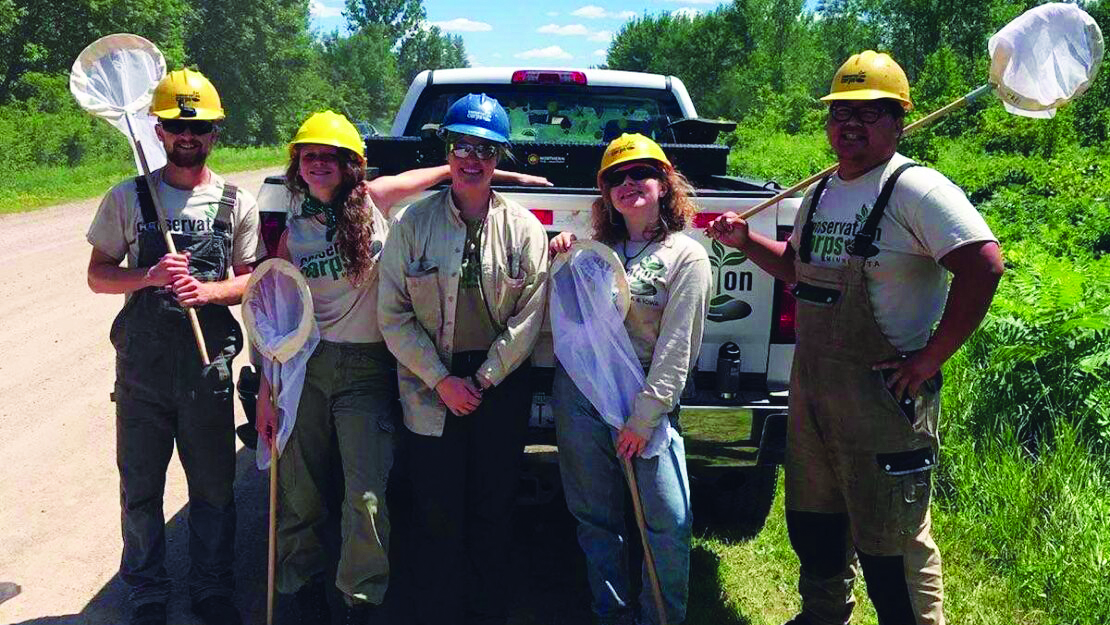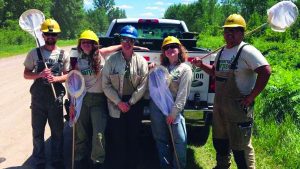Conservation Corps expand to Cedar Falls
Jan 27, 2022
The Conservation Corps of Minnesota and Iowa has recently expanded into the Cedar Falls area, providing hands-on opportunities for young adults drawn to the field of conservation.
With the Conservation Corps, teams of 18 to 25-year -old full-time volunteers go out into natural areas of the midwest and actively participate in habitat improvement, invasive species management, and more in order to preserve and improve landscapes. As listed on their website, so far the organization has worked to plant over 640,000 trees and shrubs and to maintain over 8,000 miles of trails and waterways.
The organization is a private nonprofit, and it provides its members far more than just volunteer opportunities. All of the crew members are considered AmeriCorps members, meaning that each person is a service worker or volunteer in the eyes of the government. They receive a living stipend, and much of the work emphasizes training and professional development to set the volunteers up for future potential careers in conservation.
The program is headquartered in Saint Paul, Minn. but crews have done extensive work in northeastern Iowa for a number of years. The Conservation Corps hopes that establishing a more formal presence in the Cedar Falls area will help them improve area landscapes and habitats much more efficiently.
Brad Lathrop is the Eastern Iowa Field Coordinator with the Conservation Corps, and he thinks that this new expansion will serve as an incredibly valuable resource for UNI students. “I think people who have spent time in northeast Iowa know that it’s sort of a hidden gem of midwestern ecology,” he says.
When he first began as a crew member with the organization, he spent time of his own in the Cedar Valley, and recollects those experiences as some of his favorite projects.
After graduating from Augustana College with degrees in environmental science and geography in 2020, Lathrop, like many recent college graduates, was uncertain what his next career steps would be. “I found myself in a situation where I was having to decide exactly what I wanted to do, and I didn’t really know the answer,” he explained, “but I knew I wanted to get outside.”
“I think it’s a perfect position for someone fresh out of college who has an inkling that they want to do something in the field of conservation or environmental science, but maybe they’ve only had classroom experience, and they really want to get out there,” he adds.
In addition, members who complete an 11-month term receive an education award: $6,000 from AmeriCorps that may be spent however the recipient pleases. Many people put the money toward going back to college, paying off student loans or furthering their vocational training.
Lathrop encourages anyone at all interested in working outdoors in conservation to take a closer look at the Conservation Corps, no matter their experience level. The members include people from a wide variety of backgrounds, Lathrop recalling that his first crew contained people ranging from a theatre major to a physical therapy student.
Lathrop hopes that highlighting opportunities for conservation work in people’s own communities will help the field to expand. As Iowa’s landscape is most frequently associated with farmland, many do not realize that it contains what Lathrop referred to as “some of the most high quality prairies and woodlands.” He feels that people will be much more encouraged to get involved in conservation once they realize that opportunities lie within their own backyards.
Currently, two crews of six people each operate in the area. The next wave of hiring to fill out those crews will begin in May. Interested individuals can find more information at conservationcorps.org.













Melinda Eckhardt • Feb 3, 2022 at 9:17 pm
So proud of you, Brad! You are living your dream!